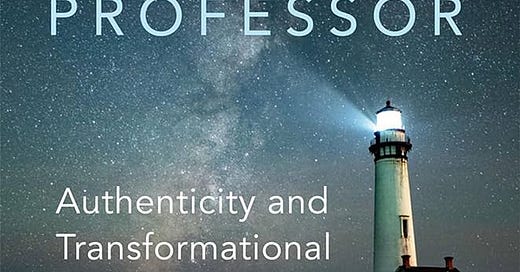CETL in the News - April and May Roundup
This spring, CETL staff continued sharing their expertise in teaching and learning with the broader education community.
My favorite bit of CETL news from the late spring was the unveiling of the cover to CETL associate director Liz Norell’s forthcoming book, The Present Professor: Authenticity and Transformational Teaching. Just look at this beautiful cover:
Here’s an excerpt from the description of Liz’s book:
At a time of crisis in higher education, as teachers struggle to find new ways to relate to, think about, and instruct students, this book holds a key. Implementing more inclusive pedagogies, Norell suggests, requires sorting out our own identities. In short, if we want to create spaces where students have the confidence, comfort, and psychological safety to learn and grow, we have to create spaces where we do, too. The Present Professor is dedicated to that proposition, and to helping educators build that transformational space.
The Present Professor will be published in December 2024 by the University of Oklahoma Press as part of the new "Teaching, Engaging, and Thriving in Higher Ed" series edited by James M. Lang and Michelle D. Miller, and pre-orders are now open.
Meanwhile, CETL director Josh Eyler continues to share the research from his forthcoming book, Failing Our Future: How Grades Harm Students, and What We Can Do About It. In early April Josh was interviewed by reporter Jeffrey Young for the EdSurge podcast in an episode titled “Is It Time for a National Conversation About Eliminating Letter Grades?” Josh talked about the problems with grades and grading, the need for system-level conversations about grades, and how to respond to parents and students skeptical about leaving grades behind. Listen here or search for “EdSurge” in your favorite podcast app.
More recently, Josh wrote another essay appearing in the Saturday Evening Post. This one is titled “The Math Wars: Timed Tests, Math Anxiety, and the Battle Over How We Teach Our Kids.” In the essay, Josh wades into current debates over the link between timed math tests and math anxiety, both of which are very real parts of math education, especially at the K-12 level. “Remember those quizzes where you had to solve as many multiplication problems as possible in less than a minute?” Josh asks. I do! I loved those. But I’m the oddball who went on to get a PhD in mathematics. The fact that timed arithmetic tests worked for me is no reason to conclude they work for every learner. In the essay, Josh reminds us that education is complicated and that “when it comes to our work with students, we should always err on the sides of concern and empathy.”





